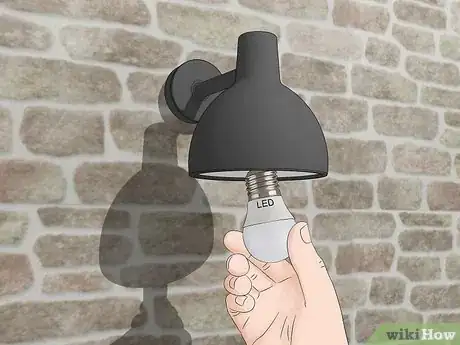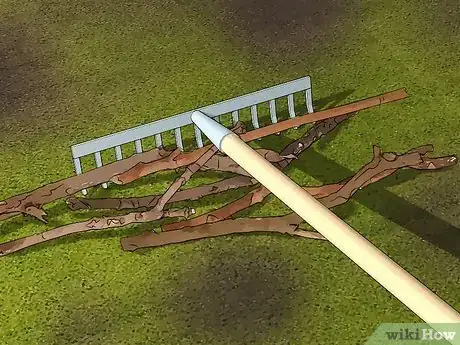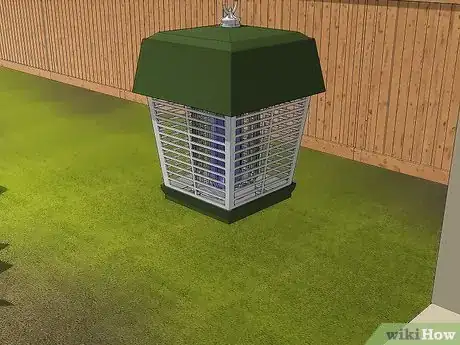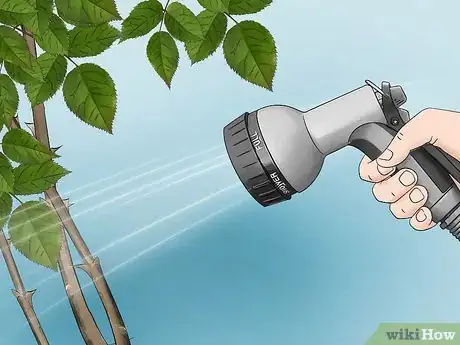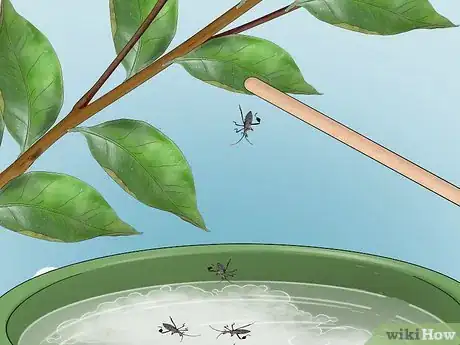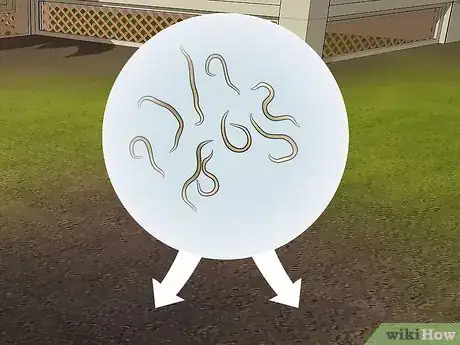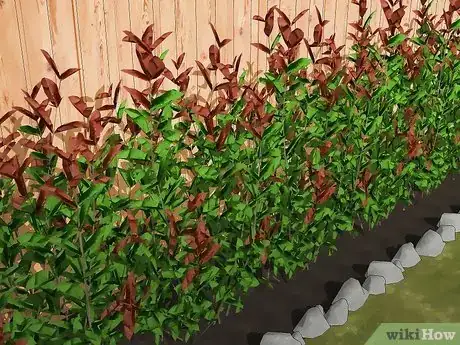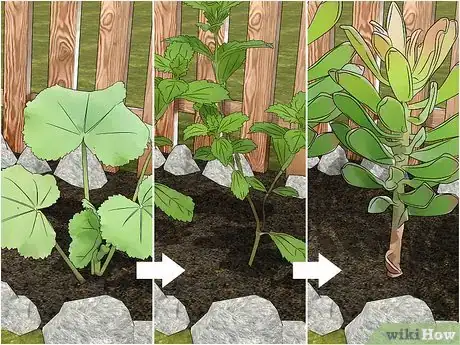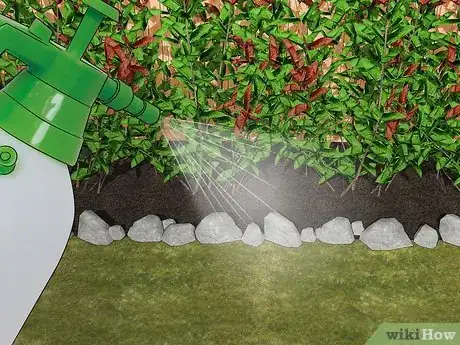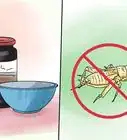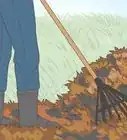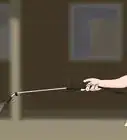This article was co-authored by Elmer Bensinger and by wikiHow staff writer, Hannah Madden. Elmer Bensinger is a Pest Control Specialist with Eden Advanced Pest Technologies in Spokane, Washington. With over 20 years of experience, Elmer specializes in integrated pest management and products such as insecticides and rodenticides. He studied business at South Puget Sound Community College.
There are 11 references cited in this article, which can be found at the bottom of the page.
This article has been viewed 9,077 times.
Whether they’re eating your plants or biting and stinging you, insects in your yard can be a nuisance. While all outdoor areas will always have insects in them somewhere, there are steps you can take to reduce the annoying pests and keep your yard area bug-free. Keep reading to learn both prevention and control techniques you can use on your property to enjoy being outside again.
Steps
Monitor your yard and identify which pests you have.
-
Experts stress the importance of finding out which specific pest you have. Pest management is very broad, and sometimes, specific pests require very specific treatment methods. First, try looking up invasive pests in your area and what signs to watch out for. Then, take a look at the plants in your garden for signs of damage. Usually, you can tell what kind of bugs are in your yard by what they’re doing to your plants.[1] X Research source
Mow your lawn often.
-
Insects love to hide in tall grass and weeds. If you have a lot of grass in your yard, be sure to mow it at least once a week to keep it short and trimmed. Bag the clippings and dispose of them off your property to get rid of any pests that may be lurking. You may also want to take a weed whacker to any tall weeds or shrubs in your yard, since those can attract bugs, too. This is a great way to keep ticks out of your yard, since they love to climb up tall blades of grass.[4] X Trustworthy Source Consumer Reports Nonprofit organization dedicated to consumer advocacy and product testing Go to source
- Try to remove weeds from your garden often, too. Pests are attracted to weeds, so your garden will look less inviting if it’s freshly manicured.[5] X Research source
Replace your outdoor lights with LED bulbs.
-
LED bulbs are less likely to attract insects. If you have any outdoor lights, try switching them to LED bulbs so insects aren’t drawn to your yard after dark. Plus, LED lights are more energy efficient, so you might even save some money![6] X Research source
- You can find LED bulbs at most hardware stores. Keep in mind, though, that some older light fixtures don’t take LED bulbs.
Get rid of standing water.
-
Standing water is a breeding ground for insects, including mosquitoes. If you have any pools of standing water in your yard, dig a trench that leads downhill and line it with peat moss. You can add a french drain to the trench if you need to, or you can simply let the water drain out and into the ground. You can still keep bird baths or kiddie pools in your yard, but try to drain and refill them at least once a week to avoid creating a habitat for insects.[7] X Trustworthy Source United States Environmental Protection Agency Independent U.S. government agency responsible for promoting safe environmental practices Go to source
- The same goes for running water, too. If you have any leaks outside, try to stop them so that insects don’t flock there for drinking water.
- If there’s a pool or hot tub in your yard, make sure to treat it with chemicals often to discourage pests.
Remove clutter from your yard and garden.
-
Piles of wood and debris make perfect homes for insects. Go through your yard and clear out any large piles of garbage or wood if you can. Things like magazines, cardboard, and newspapers are perfect homes for bugs, so be sure to throw those away first. If you need to stack firewood outside, keep it far away from your home or your deck so that the insects don’t bother you.[8] X Trustworthy Source United States Environmental Protection Agency Independent U.S. government agency responsible for promoting safe environmental practices Go to source
- Insects like termites, spiders, and beetles often live in large piles of clutter outside.
Cover your garbage cans with lids.
-
Rotting food and garbage attracts a lot of insects. If you keep your garbage cans on your lawn most of the time, make sure the lids fit tightly, and try to keep them closed as much as possible. If you store any food outside, seal it tightly in glass or plastic containers so that insects aren’t drawn to it.[9] X Trustworthy Source United States Environmental Protection Agency Independent U.S. government agency responsible for promoting safe environmental practices Go to source
- Garbage tends to attract insects like flies and wasps.
Burn citronella candles.
-
These candles are natural insect repellants, especially for mosquitoes. If you’re outside and you notice a lot of bugs flying around, try lighting a candle that contains citronella oil. The smoke combined with the natural smell will repel bugs, and you may notice that they avoid the area with the candles.[10] X Research source
- Smaller candles are great for porches and patios with smooth, flat surfaces to balance on. If you’d like to arrange candles on a grassy lawn, buy some backyard torches.
- If you have a large yard, you might need more than one candle to be effective.
Hang bug zappers around the yard.
-
Zappers kill flying insects with a short burst of electricity. If you’re often bothered by buzzing insects (especially at night), try hanging a few bug zappers around your yard to kill the pests as they fly in. Keep in mind, though, that bug zappers don’t discriminate, and they might end up killing a few of the good bugs along with the bad ones.[11] X Research source
- Bug zappers are most effective against mosquitoes and moths.
Set up pest traps.
-
You can kill large amounts of insects at once with a trap. Take a few minutes to figure out what kind of pest is flying around your yard before you go out and buy a trap. Each pest trap is slightly different, and they usually vary based on what kind of insect you’re trying to kill. Once you figure out what’s in your yard, head to a hardware store and find a pest trap for you.[12] X Research source
- Bee, wasp, and mosquito traps are the most common types of pest traps available.
- If bees are your issue, you can make your own trap out of a 2-liter soda bottle and some honey.
Use water to wash off small, leaf-eating bugs.
-
Aphids and small pests might only need a blast of water to die. If you catch any of these tiny, leaf-eating bugs on your plants, grab your garden hose and spray them to the ground. You can keep doing this every time you see them, and eventually, you can get rid of them this way.[13] X Research source
- Aphids can be a menace, especially in an edible garden. If you deal with a lot of aphids, you could also release ladybugs into your yard to eat the aphids. Ladybugs aren’t pests, so they won’t do any damage to your garden.
Knock off larger insects into a bucket of soapy water.
-
You can deter caterpillars and larger insects by picking them off plants. Walk through your yard with a bucket of soapy water in-hand. If you see any large critters on your plants, knock them into the soapy bucket. Since the water has soap in it, they won’t be able to swim, and they’ll drown fairly quickly.[14] X Research source
- This works well if you only have a few large bugs munching on your plants. However, it’s a little too labor intensive for large infestations.
Release parasitic nematodes in your garden.
-
These microscopic organisms burrow into the dirt and feed on pests. Although it might sound strange, nematodes kill pests like caterpillars, termites, and maggots by burrowing into their bodies and eating them from the inside. Once the nematodes have destroyed all the pests in your yard, they’ll continue living in your soil, feeding off of bad bacteria and fungi in your dirt.[15] X Research source
- You can find parasitic nematodes at most garden supply stores. Experts recommend buying 13,000 to 35,000 nematodes per square foot.
Spray leafy plants with neem oil.
-
Neem oil is a natural pest repellent that also discourages fungus. Pick up a bottle of neem oil from your local hardware store and follow the dilution instructions on the back of the bottle. Use your neem oil spray on plants with big green leaves to repel and kill garden pests.[16] X Research source
- Neem oil is safe to use around animals and children, and you can even spray it on edible plants.
- However, neem oil is slightly toxic to birds and fish. Try not to spray neem oil right before it rains, as that can wash it into the waterways and harm aquatic animals.[17] X Trustworthy Source University of California Division of Agriculture and Natural Resources Extension program of the University of California system devoted to educating and improving local communities Go to source
Attract predators to eat insects.
-
Birds and bats are natural predators of most insects. Consider setting up a bird house or a bat house in your yard to attract them. You can also put out bird feeders or a bird bath to get birds in your yard all throughout the day. Birds are afraid of shiny, metal objects, so try to keep your yard free of metallic lawn decorations.[18] X Trustworthy Source Consumer Reports Nonprofit organization dedicated to consumer advocacy and product testing Go to source
- Birds and bats are especially effective against ants and aphids.
Grow plants that will thrive in your yard.
-
Unhealthy plants attract pests. Spend a little time figuring out which plants do best in your yard and what they need to survive. For instance, some plants need full sun for 8 hours a day, while others prefer partial shade. Some plants need to be watered every day, while other plants can go without for a week or more. The more you take care of the plants in your yard, the less bugs you’ll find overall.[19] X Research source
- The same goes if you’re growing an edible garden, too. Be sure that you’re planting crops at the right time, and get rid of anything that’s rotting or gone bad.
Rotate your crop selection every year.
-
Planting the same crops every year can encourage pests. Some garden insects, like caterpillars, lay eggs in plants that they know will come back next year. A good way to eliminate this problem is to plant new plants every year, especially in an edible garden. If you don’t want to plant new plants entirely, you can try rotating the spots they were in to discourage pests from coming back.[20] X Research source
- Try to keep a rotation for 3 to 4 years before starting the rotation over again.
Plant herbs that are natural pest deterrents.
-
Bugs tend to stay away from some plants because of their smell. If you have any extra space, consider planting a natural repellent, like tulsi, lavender, marigolds, lemon balm, lemongrass, citronella, catnip, basil, garlic, peppermint, rosemary, pennyroyal, geraniums, or sage. Position these around the perimeter of your yard so that pests are less likely to fly in.[21] X Research source
- This is a great way to repel mosquitoes.
Spray pesticides as a last resort.
-
These harsh chemicals will kill any pests in your yard. However, pesticides can also harm the good insects, and they can even be dangerous to use around animals and small children. If you’d like to use a pesticide in your yard, be sure to follow all safety instructions on the container, and only spray them where you’ve noticed the pests.[22] X Trustworthy Source United States Environmental Protection Agency Independent U.S. government agency responsible for promoting safe environmental practices Go to source
- If you are spraying pesticides yourself, wear gloves, long sleeves, and safety goggles for protection. Don’t spray on a windy or rainy day, as that can blow pesticides into other yards or back onto yourself.
- You can also hire a professional to spray your yard with pesticides.
You Might Also Like

 The Best Ways to Get Rid of Cockroaches in Your Home
The Best Ways to Get Rid of Cockroaches in Your Home
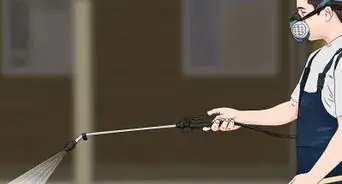

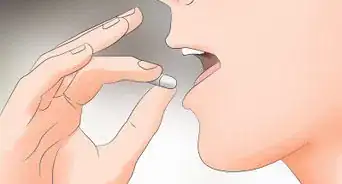
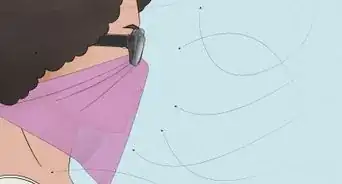 How to Drive Away Gnats for Good: Easy DIY Methods
How to Drive Away Gnats for Good: Easy DIY Methods
 Do You Have Animals in Your Walls? Dealing with Animals in Your Walls or Attic
Do You Have Animals in Your Walls? Dealing with Animals in Your Walls or Attic
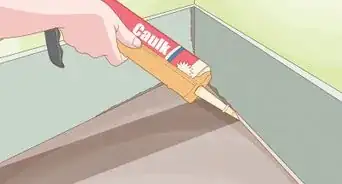 The Best Ways to Get Rid of Silverfish Once and for All
The Best Ways to Get Rid of Silverfish Once and for All
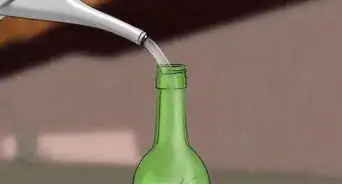
 How to Remove Bats from Your Home
How to Remove Bats from Your Home
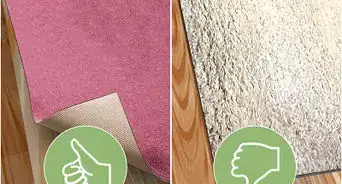
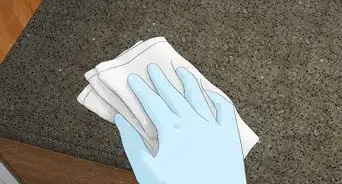
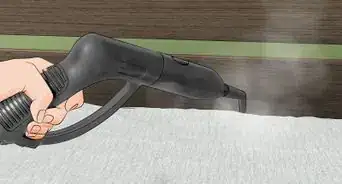

References
- ↑ https://content.ces.ncsu.edu/extension-gardener-handbook/8-integrated-pest-management-ipm
- ↑ https://www.doi.gov/sites/doi.gov/files/uploads/CEO_SC_ClemsonPresentation_Junior%20InspectorHandbook.pdf
- ↑ https://www.doi.gov/sites/doi.gov/files/uploads/CEO_SC_ClemsonPresentation_Junior%20InspectorHandbook.pdf
- ↑ https://www.consumerreports.org/pest-control/tickproof-your-yard-without-spraying/
- ↑ https://extension.okstate.edu/fact-sheets/home-vegetable-garden-insect-pest-control.html
- ↑ https://www.goodhousekeeping.com/home/gardening/tips/a24215/outdoor-lighting-rules/
- ↑ https://www.epa.gov/safepestcontrol/dos-and-donts-pest-control
- ↑ https://www.epa.gov/safepestcontrol/dos-and-donts-pest-control
- ↑ https://www.epa.gov/safepestcontrol/dos-and-donts-pest-control
- ↑ https://www.thisoldhouse.com/pest-control/21234471/best-ways-to-get-rid-of-mosquitoes
- ↑ https://www.thisoldhouse.com/pest-control/21234471/best-ways-to-get-rid-of-mosquitoes
- ↑ https://www.thisoldhouse.com/pest-control/21234471/best-ways-to-get-rid-of-mosquitoes
- ↑ https://www.goodhousekeeping.com/home/gardening/a20705991/garden-insect-pests/
- ↑ https://www.bhg.com/gardening/pests/insects-diseases-weeds/how-to-get-rid-of-bugs-in-your-garden/
- ↑ https://www.goodhousekeeping.com/home/gardening/a20705991/garden-insect-pests/
- ↑ https://www.goodhousekeeping.com/home/gardening/a20705991/garden-insect-pests/
- ↑ https://ucanr.edu/datastoreFiles/268-754.pdf
- ↑ https://www.consumerreports.org/pest-control/how-to-get-rid-of-ants-in-the-house-a3627053544/
- ↑ https://content.ces.ncsu.edu/extension-gardener-handbook/8-integrated-pest-management-ipm
- ↑ https://content.ces.ncsu.edu/extension-gardener-handbook/8-integrated-pest-management-ipm
- ↑ https://www.thisoldhouse.com/pest-control/21234471/best-ways-to-get-rid-of-mosquitoes
- ↑ https://www.epa.gov/safepestcontrol/dos-and-donts-pest-control
About This Article



